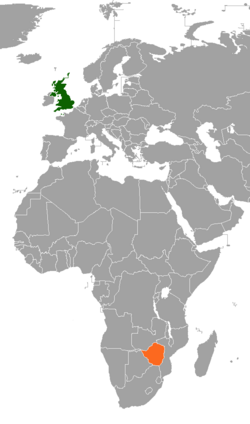United_Kingdom–Zimbabwe_relations
United Kingdom–Zimbabwe relations
Bilateral relations
Relations between the UK and Zimbabwe have been complex since the latter's independence in 1980. The territory of modern Zimbabwe had been colonised by the British South Africa Company in 1890, with the Pioneer Column raising the Union Jack over Fort Salisbury (modern-day Harare) and formally establishing company, and by extension, British, rule over the territory.[1] In 1920 Rhodesia, as the land had been called by the company in honour of their founder, Cecil Rhodes, was brought under jurisdiction of the Crown as the colony of Southern Rhodesia. Southern Rhodesia over the decades following its establishment would slowly be populated by large numbers of Europeans emigrants who came to form a considerable diaspora, largely consisting of Britons but also smaller groups of Italians, Greeks and Afrikaners.[2] A settler culture that had already existed since the time of company would come to cement fully and the white population began to identify as Rhodesians, often in conjunction with British/Afrikaner/Southern European identities of their ancestors.[3] Southern Rhodesia would go on to participate heavily in both the First and Second wars, providing soldiers and military equipment to the British war effort.[4][5] During the years after the war, the relationship between Britain and Southern Rhodesia became increasingly strained. The UK had opted to decolonise Africa and had adopted a firm policy of no independence before majority rule, which deeply upset the white establishment of the colony, in particular the radical Rhodesian Front party led by Winston Field and later, Ian Smith. Relations between the British Government and the colonial Southern Rhodesian government deteriorated for much of the early 1960s and negotiations between the two dragged on with little to no success. Eventually, relations broke down entirely and Southern Rhodesia unilaterally declared independence from Britain.[6] The move was met with zero recognition (bar Apartheid South Africa and Portugal, both of whom never formally recognised Rhodesia as sovereign and only tacitly cooperated with them) from the international community and the UK government and the illegitimate state was still formally considered under British sovereignty for its roughly 15-year span of existence.[7] For the first 5 years of its proclaimed independence, Rhodesia still declared loyalty to the Queen Elizabeth II as a would-be Commonwealth realm, but this was never recognised by the British monarch who continued to encourage Smith's illegal government to resign. Given her refusal to appoint a Governor-general, from 1965 to 1970 an "Officer Administering the Government" served as the de facto head of state. Rhodesia eventually moved to sever all links with Britain and became a republic with a president in 1970.[8] Throughout the subsequent Rhodesian Bush War between white Rhodesians and black paramilitaries such as ZANU and ZAPU, the UK continued to remain staunchly opposed to the rogue state and extensively sanctioned it, even enforcing blockades using the Royal Navy to cut off Rhodesian oil imports via Portuguese Mozambique.[9] When Rhodesia failed to hold out after 15 years of fighting and came to the negotiating table with the black resistance groups and moderate African nationalist parties, the UK again became directly involved in Rhodesia's affairs. After a brief stint as the nation of Zimbabwe Rhodesia following an Internal Settlement that was denounced by the international community for not being satisfactory enough, the nation transiently reverted to its status as a self-governing British colony before being granted full independence and majority rule as Zimbabwe in 1980 under the landmark Lancaster House Agreement.[10]
This article has multiple issues. Please help improve it or discuss these issues on the talk page. (Learn how and when to remove these template messages)
|
Relations between the UK and Zimbabwe in the two decades directly following independence were close and friendly, as a large amount of the British descended white settlers remained in the country (though there was some exodus, but not overly significant) and continued to serve in important positions in politics, business, media, law and most notably agriculture.[11] The UK and Zimbabwe cooperated on many levels and the relationship between Mugabe and Thatcher was reportedly close.[12] This strong period of relations lasted for roughly 20 years until Tony Blair withdrew British funding for land reform in the country, a policy Blair disagreed with. This, coupled with British government's strong condemnation of various human rights abuses committed by Mugabe against opposition groups led to a severe collapse in relations between the two nations. Mugabe proceeded to engage in a mass eviction of white landowners from their farms, which directly led to the collapse of Zimbabwean economy, national food supply and agricultural exports.[13] Following this was a mass exodus of middle to high class White Zimbabweans from the country, with many having been highly educated and working in fields such as the law and education.[14][15] Many of them fled to the UK due to their British culture and ancestral connections.[16][17] After a coup d'état against Mugabe due to widespread economic failure and oppression, Emmerson Mnangagwa was elected as the President of Zimbabwe and made significant overtures to the whites that had left the country during Mugabe's presidency. He promised all seized land would be restored and significant financial compensation given for the loss of land, Mnangagwa also offered to pay a fee for anyone willing to return and farm in the country in an effort to bring back Zimbabwe's functioning food production.[18][19][20] In light of this, relations between the UK and Zimbabwe have been slowly improving under Mnangagwa, and the country applied to rejoin the Commonwealth in 2018 after its 2003 withdrawal. Tensions still remain however over human rights and particularly the Zimbabwean Army's role in suppressing internal dissent.[21][22][23]
